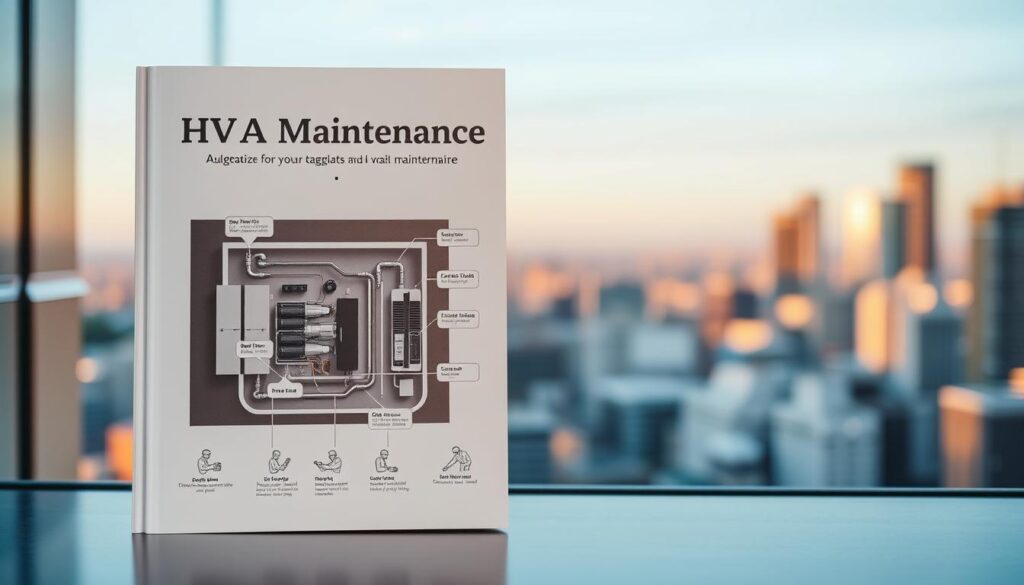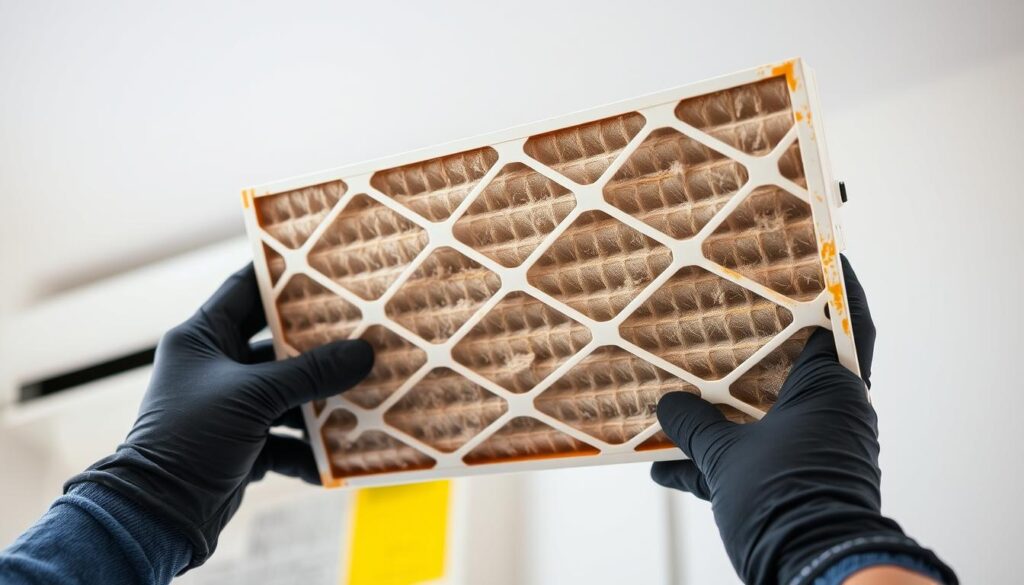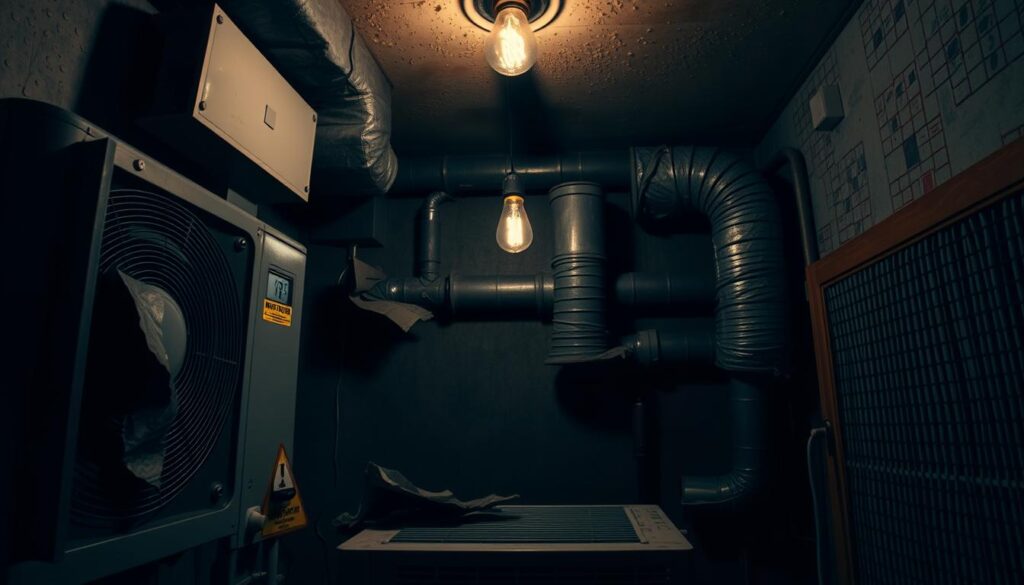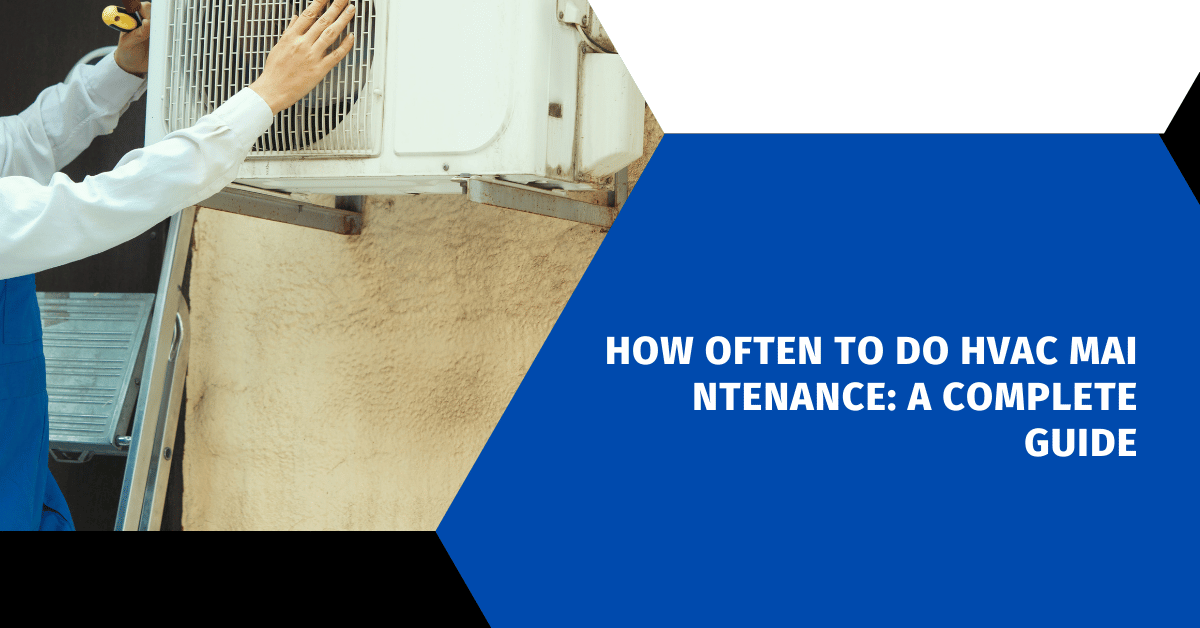Affiliate Disclosure
HVAC Guide Guys is a participant in the Amazon Services LLC Associates Program, an affiliate advertising program designed to provide a means for sites to earn advertising fees by advertising and linking to Amazon.
How Often to Do HVAC Maintenance? Are you unknowingly shortening the lifespan of your home’s most expensive cooling and heating system? Knowing how often to do HVAC maintenance can save you thousands in repair and replacement costs.

Your HVAC system is the unsung hero of home comfort. It works hard to keep your living spaces comfortable all year. Regular maintenance is not just a suggestion—it’s a key investment in your home and your family’s comfort.
An effective HVAC maintenance schedule keeps your system running smoothly. It prevents unexpected breakdowns and extends your equipment’s life. By being proactive, you can catch issues before they turn into expensive repairs.
Key Takeaways
- Regular maintenance prevents expensive system failures
- Professional inspections should occur twice yearly
- DIY maintenance can supplement professional service
- Maintenance improves energy efficiency
- Clean filters are key for system performance
Table of Contents
Understanding HVAC Preventive Maintenance Basics
Keeping your home comfortable and energy-efficient is key. Preventive maintenance catches issues early, saving you money. It keeps your heating and cooling systems working well all year.
Your HVAC system has many parts working together. Regular maintenance keeps it running smoothly. It also protects your investment from sudden breakdowns.
What Preventive Maintenance Includes
HVAC preventive maintenance covers several important tasks:
- Comprehensive system inspections
- Cleaning of critical components
- Lubrication of moving parts
- Checking electrical connections
- Calibrating thermostat settings
Key Components Requiring Regular Service
| Component | Maintenance Focus | Recommended Frequency |
|---|---|---|
| Air Filters | Cleaning/Replacement | Every 1-3 months |
| Condenser Coils | Cleaning and Inspection | Annually |
| Electrical Connections | Tightening and Testing | Bi-annually |
Benefits of Regular Maintenance
Regular HVAC maintenance offers many benefits:
- Improved Energy Efficiency
- Extended System Lifespan
- Reduced Repair Costs
- Enhanced Indoor Air Quality
By focusing on preventive maintenance, you keep your HVAC system in top shape. This ensures your home stays comfortable and reliable all year.
How Often to Do HVAC Maintenance
Keeping your HVAC system in top shape is key. Experts say you should do maintenance at least twice a year. This keeps it running well and avoids sudden breakdowns.
Your hvac maintenance schedule should include:
- Spring service for cooling systems
- Fall service for heating systems
- Annual complete system check
How often you need to do hvac maintenance depends on a few things:
- System age: Older systems might need more checks
- How you use it and the weather
- What the maker says
“Regular maintenance is the key to extending your HVAC system’s lifespan and maintaining energy efficiency.” – HVAC Industry Expert
For most people, doing maintenance twice a year is best. It catches problems early, saving you money and keeping your system working well all year.
The weather where you live also matters. Places with really hot or cold weather might need more checks to handle the extra stress.
Explore Our HVAC Shop
Looking for top-rated HVAC tools, parts, and accessories? Visit our shop and find the perfect solution for your needs.
Visit the ShopSeasonal Maintenance Requirements for Your HVAC System
Keeping your HVAC system in top shape is key. Seasonal maintenance stops unexpected breakdowns and boosts performance. Knowing when to do air conditioning and furnace maintenance can save you money and make your system last longer.
Spring and Summer Maintenance Tasks
Get your air conditioning ready for the hot months with these steps:
- Clean or replace air filters monthly
- Inspect and clean condenser coils
- Check refrigerant levels
- Clear debris around outdoor units
- Test thermostat functionality
Fall and Winter Service Checklist
When it gets cold, focus on your furnace to keep warm:
- Inspect heat exchangers for cracks
- Check gas connections and pilot lights
- Lubricate moving parts
- Clean burners and combustion chambers
- Verify carbon monoxide detectors
Year-Round Maintenance Requirements
Year-round care is essential for your HVAC. Here’s a guide to keep it running well:
| Maintenance Task | Frequency | Impact |
|---|---|---|
| Air Filter Replacement | Every 1-3 months | Improves air quality and system efficiency |
| Professional Inspection | Twice per year | Prevents major system failures |
| Thermostat Calibration | Annually | Ensures accurate temperature control |
Pro tip: Regular maintenance can reduce energy costs by up to 15% and extend your HVAC system’s life by several years.
Essential Air Filter Maintenance Guidelines

Your HVAC system works best with good air filter care. Regular maintenance starts with knowing how important air filters are. They keep your home comfortable and the air clean.
Air filters are key in keeping your HVAC system running smoothly. They protect your equipment and help air move better inside. Dirty filters can cut system efficiency by 15%, raising energy costs and risking damage.
- Check filters every 30-90 days
- Replace disposable filters quarterly
- Clean reusable filters monthly
- Consider filter type and home conditions
Different homes need different air filter care. If you have pets, allergies, or lots of dust, you might need to change filters more often.
| Filter Type | Replacement Frequency | Recommended For |
|---|---|---|
| Fiberglass | Every 30 days | Basic dust protection |
| Pleated | Every 90 days | Better air quality |
| HEPA | Every 6-12 months | Allergy sufferers |
Always pick the right size and type of filter for your HVAC system. Measure your current filter’s dimensions before buying a new one.
Explore Our HVAC Shop
Looking for top-rated HVAC tools, parts, and accessories? Visit our shop and find the perfect solution for your needs.
Visit the ShopProfessional vs DIY HVAC Maintenance
Maintaining your HVAC system needs a mix of DIY and professional help. Knowing what you can do yourself and when to call a pro is key. This balance is essential for keeping your HVAC in top shape.
DIY Maintenance Tasks You Can Perform
Some tasks are easy for homeowners to do:
- Replace air filters every 1-3 months
- Clean air vents and return registers
- Clear debris around outdoor unit
- Check thermostat settings and batteries
- Inspect visible ductwork for obvious damages
When Professional Help Becomes Essential
Some issues need a pro’s touch:
- Refrigerant level checks and recharging
- Electrical system diagnostics
- Comprehensive system performance evaluations
- Major component repairs or replacements
- Annual professional inspections
Cost Comparison Insights
Professional HVAC maintenance costs $75 to $200 per visit. DIY tasks can save money, but complex repairs might cost $100 to $1,600. Getting professional help can save you money in the long run by avoiding expensive repairs.
Remember: Regular maintenance is always cheaper than emergency repairs.
Signs Your HVAC System Needs Immediate Service

Spotting early signs of HVAC problems can prevent costly repairs and sudden breakdowns. Your HVAC system sends out signals when it’s facing issues. These signs are important to notice during regular maintenance.
Look out for these key warning signs that mean your system needs urgent service:
- Unusual Noises: Sounds like banging, squealing, or grinding mean there’s a mechanical problem inside
- Weak Airflow: If air isn’t circulating well, it could be due to blocked ducts or a failing compressor
- Inconsistent Temperatures: If rooms aren’t cooling or heating evenly, it’s a sign of a problem
- Unexpected Energy Bill Increases: A sudden jump in your energy bill could mean your system is not working efficiently
Strange smells are also a warning sign. Musty smells might mean mold, while burning smells could point to electrical issues. Water leaks or too much humidity inside your home also need a quick check by a pro.
Systems that cycle on and off too much or can’t keep the temperature right need a pro to look at them. Catching these signs early can stop a complete breakdown and make your system last longer.
Experts say to fix warning signs within 24-48 hours to avoid major damage.
Explore Our HVAC Shop
Looking for top-rated HVAC tools, parts, and accessories? Visit our shop and find the perfect solution for your needs.
Visit the ShopMaintenance Requirements for Different HVAC Types
Your HVAC system’s maintenance needs vary by type. Knowing what each system needs helps you make a good maintenance schedule. This way, you can keep your air conditioning running smoothly.
Every HVAC system has its own maintenance needs. This care protects your investment and keeps your system running well. By understanding your system’s specific needs, you can avoid expensive repairs and make it last longer.
Central Air Systems
Central air conditioning systems need regular care to stay efficient. Your maintenance routine should include:
- Cleaning or replacing air filters every 1-3 months
- Annual professional inspection of refrigerant levels
- Checking and cleaning condenser coils
- Inspecting ductwork for possible leaks
Heat Pumps and Mini-Splits
Heat pumps need the same care as air conditioning systems. Professional technicians suggest service twice a year – before summer and before winter. Key tasks include:
- Cleaning the outdoor unit and removing debris
- Checking refrigerant levels
- Lubricating moving parts
- Examining electrical connections
Furnace Systems
Furnace maintenance focuses on burning efficiently and safely. Your annual maintenance schedule should include:
- Cleaning burners and heat exchangers
- Checking gas connections
- Replacing air filters
- Inspecting exhaust flue and ventilation
Customizing your maintenance for your HVAC type ensures the best performance and longevity.
Cost Benefits of Regular HVAC Maintenance
Investing in hvac preventive maintenance is wise. It keeps your system running well and saves money. The US Environmental Protection Agency (EPA) says every dollar spent on maintenance can save up to four dollars in repair costs.
Regular hvac tune-ups have many financial benefits. They include:
- Lower energy bills by making your system more efficient
- Save on emergency repairs
- Make your expensive HVAC equipment last longer
- Keep your home comfortable
Think about the long-term savings. A well-maintained HVAC system can be up to 40% more efficient. This means lower energy bills and fewer repair costs. Homeowners who maintain their systems regularly spend less on big repairs and replacements.
“Preventive maintenance is an investment, not an expense.”
By focusing on regular professional checks and maintenance, you protect your HVAC system and your wallet. The cost of routine checks can avoid hundreds or thousands of dollars in future repairs.
Extended System Lifespan Through Proper Maintenance
Keeping your HVAC system in top shape is key to its long life. With regular care, your system can last up to 20 years or more. This is a big deal for your home’s comfort and energy use.
Regular maintenance stops problems before they start. It finds issues early, saving you from expensive fixes. This keeps your system running smoothly and efficiently.
- Routine inspections catch minor problems early
- Clean components reduce strain on system parts
- Professional tune-ups optimize performance
Investing in your HVAC system pays off when you maintain it well. Regular check-ups can save you thousands on new systems.
| Maintenance Frequency | Potential System Lifespan | Estimated Cost Savings |
|---|---|---|
| Annual Professional Service | 15-20 years | $3,000-$5,000 |
| Irregular/No Maintenance | 8-10 years | $0 (Requires Early Replacement) |
Consistent care transforms your HVAC system from a financial burden into a reliable comfort solution.
Explore Our HVAC Shop
Looking for top-rated HVAC tools, parts, and accessories? Visit our shop and find the perfect solution for your needs.
Visit the ShopCommon HVAC Maintenance Mistakes to Avoid
Keeping your HVAC system in good shape is more than just comfort. It’s about protecting a big investment and avoiding costly mistakes. These mistakes can really hurt your wallet.
Many homeowners unknowingly harm their HVAC system’s performance. They make big mistakes in their maintenance approach. Knowing these common errors can save you thousands in repairs.
- Neglecting Regular Filter Changes: Dirty filters make your system work harder. This reduces efficiency and raises energy costs.
- Blocking air vents with furniture or curtains disrupts airflow. It also strains your system.
- Trying complex repairs without the right knowledge is risky.
- Skipping annual professional inspections is a big mistake.
DIY repairs might seem appealing, but they often lead to bigger, more expensive problems. A small issue can turn into a major breakdown. This can cost between $5,000 to $12,500.
Professional HVAC technicians can catch problems early. They prevent unexpected failures and extend your system’s life. Regular maintenance is much cheaper than emergency replacements.
“An ounce of prevention is worth a pound of cure” – this is true for HVAC systems too.
Conclusion
Regular HVAC preventive maintenance is key to a comfortable home and a well-working system. Knowing when to do maintenance helps avoid sudden breakdowns and expensive fixes. This proactive step saves money and makes your heating and cooling last longer.
Regular checks catch small problems before they grow big. You can do some tasks yourself or get help from pros. Either way, it keeps your home comfy and your investment safe. Each season has its own maintenance needs that affect your system’s performance.
Staying consistent with maintenance means lower bills, better air, and less worry. Experts say to get annual checks and change filters to keep your system top-notch. Always remember, it’s cheaper to prevent problems than to fix them after they happen.
Start a maintenance plan that fits your HVAC system today. Keep track of when you do maintenance, learn some basic skills, and work with a reliable HVAC pro. Your hard work will pay off with a reliable, efficient system for many years.

